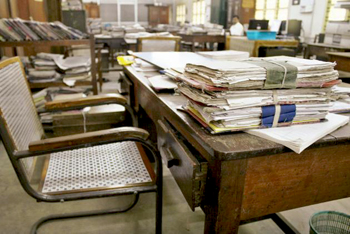New Delhi, Jun 22: The Centre today warned all its employees to come in time to offices, failure of which might attract disciplinary action.
 The Department of Personnel and Training (DoPT) has written to all central government ministries to ensure punctuality in government offices.
The Department of Personnel and Training (DoPT) has written to all central government ministries to ensure punctuality in government offices.
"Habitual late attendance is viewed as conduct unbecoming of a government servant and disciplinary action may be taken against such a government servant. It is also added that punctuality in attendance is to be observed by government servants at all levels," the DoPT said in its missive.
Service rules stipulates that every government servant shall at all times maintain devotion to duty, it said.
There are about 48 lakh central government employees working across the country.
The DoPT order said instructions have been issued from time to time with regard to the need to observe punctuality by government servants. "Responsibility for ensuring punctuality in respect of their employees rests within ministries, departments or offices," it said.
The Centre has also introduced Aadhaar-enabled enabled Bio-metric Attendance System (AEBAS) in central government offices, including attached and sub-ordinate offices, to replace the manual system of marking of attendance. The AEBAS system to ensure punctuality is to be implemented in all ministries and departments, the DoPT said.
"There have been instances of tardiness by employees in coming to offices. The ministries have been asked to ensure that all employees mark their attendance through the biometric system and take action against habitual offenders," a senior DoPT official said.
A website---www.attendance.gov.in--has also been made functional to give details of registered employees and those present in the offices on daily basis. There were 1,29,895 registered employees of which 62,761 were present today, according to the website.
The DoPT said that the biometric attendance system is only an enabling platform and there is no change in the instructions relating to office hours, late attendance etc., the order said.
As per existing instructions, half-a-day's casual leave should be debited for each day of late attendance, but late attendance upto an hour, on not more than two occasions in a month, and for justifiable reasons may be condoned by the competent authority.





Comments
Add new comment